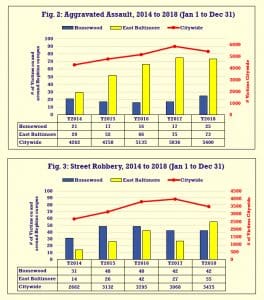More than 60 Johns Hopkins University faculty members are attempting to stop the school from creating its own private police force.
They have signed an open letter in opposition to the proposed state legislation that would authorize this change, report The Baltimore Sun.
In the letter, members wrote that armed police officers could pose an increased safety risk and “inevitably amplify the climate of fear and justify their roles by citing stops, arrests and detainments.”
Concerns for the nonwhite population in Baltimore were also voiced in the letter.
“Black and brown students and Baltimoreans are already disproportionately targeted,” they wrote. “Private police on campus are likely to exacerbate racial profiling, with even more dangers and potentially fatal consequences.”

Johns Hopkins released to The Brew these updated statistics of aggravated assaults and street robbery that took place in and around the Homewood and East Baltimore campuses between 2014 and the end of 2018.
A poll by the Student Government Association showed 75 percent of JHU undergraduates are against the legislation.
Students, faculty and residents of West Baltimore congregated this week to protest, chanting, “No justice, no peace, no private police.”
If the bill is passed, JHU would join several Baltimore schools that have their own police forces, including Morgan State University, Coppin State University, the University of Baltimore and the University of Maryland, Baltimore.
Currently, there is a group of armed off-duty Baltimore police officers and sheriff’s deputies that the university pays to patrol near its campuses. The plan would be to convert those officers into its own police force of around 100 officers.
Karen Lancaster, a spokeswoman for JHU, responded to the letter by stating, “We believe strongly that university police departments can and do make a meaningful contribution to public safety in Baltimore, and we at Johns Hopkins want to do our part.”
According to the school, it needs its own police force as Baltimore has seen an increase in violent crime (see charts from the Baltimore Brew).
Last year, the group Students Against Private Police rallied in opposition to the plan. The push for a new police force failed the first time around, however, Lancaster says the response to Senate Bill 793 has been “positive.”
While several members support creating a private police force, most of Baltimore’s legislators in the General Assembly say they remain undecided.







